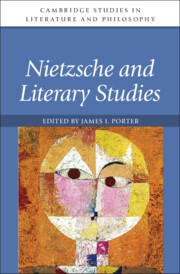Book contents
- Nietzsche and Literary Studies
- Cambridge Studies in Literature and Philosophy
- Nietzsche and Literary Studies
- Copyright page
- Contents
- Contributors
- Abbreviations
- Introduction
- 1 Heraclitus’ Clarity
- 2 Ariadne, or the Mediation of the Image
- 3 Nietzsche’s Centaurs
- 4 Nietzsche on the Task of the Poets in His Middle Writings
- 5 Some Images in Nietzsche’s Zarathustra
- 6 Nietzsche Ludens
- 7 Nietzsche and French Literature from the End of the Nineteenth Century to 1914
- 8 Ecce Mann
- 9 Plant Imaginaries and Human Existence in Nietzsche and Sartre
- 10 The Resources of the Figure
- 11 Nietzsche and Jewish Survival between Sarah Kofman and Jacques Derrida
- Editions and Translations of Nietzsche’s Works
- References
- Index
8 - Ecce Mann
Having Fun with Nietzsche
Published online by Cambridge University Press: 03 May 2024
- Nietzsche and Literary Studies
- Cambridge Studies in Literature and Philosophy
- Nietzsche and Literary Studies
- Copyright page
- Contents
- Contributors
- Abbreviations
- Introduction
- 1 Heraclitus’ Clarity
- 2 Ariadne, or the Mediation of the Image
- 3 Nietzsche’s Centaurs
- 4 Nietzsche on the Task of the Poets in His Middle Writings
- 5 Some Images in Nietzsche’s Zarathustra
- 6 Nietzsche Ludens
- 7 Nietzsche and French Literature from the End of the Nineteenth Century to 1914
- 8 Ecce Mann
- 9 Plant Imaginaries and Human Existence in Nietzsche and Sartre
- 10 The Resources of the Figure
- 11 Nietzsche and Jewish Survival between Sarah Kofman and Jacques Derrida
- Editions and Translations of Nietzsche’s Works
- References
- Index
Summary
Thomas Mann’s literary obsession with Nietzsche’ philosophy was lifelong, continuously evolving, and constantly subversive. His early short stories were preoccupied with Nietzsche’s Wagner reception and cultural critique of decadence; the middle-period novella, “Death in Venice” engaged with the mythical pair of the Dionysian and Apollonian; the novel Doktor Faustus, his self-proclaimed “Nietzsche book,” combined Nietzsche’s biography, aesthetics, and “the problem of the German.” In each phase, Mann’s reception was never simply dutiful, but rather mischievously pitted one Nietzschean position against another, deriving dramatic force from the often contradictory capaciousness of his thought. This chapter focuses on a work not always considered as part of Mann’s Nietzsche reception: Confessions of Felix Krull, Confidence Man, an early short story later expanded to become Mann’s last novel. The text playfully juxtaposes Nietzsche’s “problem of the actor” and his ideal of self-fashioning, what Alexander Nehamas describes as Nietzsche’s “life as literature.” It explores issues of style, taste, parody, “gay science,” and the concerns attendant upon the translation of Nietzsche’s literary philosophy back into literature proper. It shows how the parody and mockery of Nietzschean ideals cannot help but fall in with the models they turn on, and the implications for our understanding of Nietzsche’s own writing.
- Type
- Chapter
- Information
- Nietzsche and Literary Studies , pp. 186 - 209Publisher: Cambridge University PressPrint publication year: 2024

